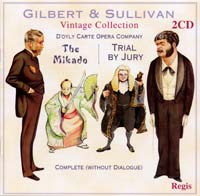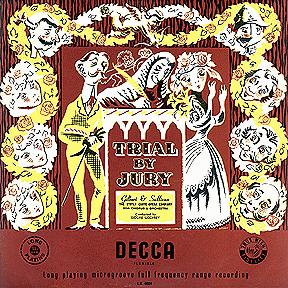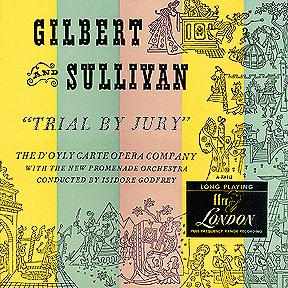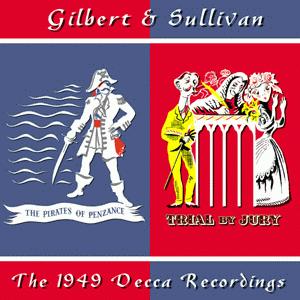The 1949 D'Oyly Carte Trial By Jury
D'Oyly Carte Opera Company
Recorded in London, |
|
 Regis RRC2041 |
After the 1936 recording of The Mikado, the combined effects of depression, war and reconstruction prevented the issue of any new recordings until 1949 (the longest such gap in history). By now, a new technology, the long-playing record, had emerged to tempt and delight the listening public. Whereas a musically-complete recording of a G&S opera took anywhere from eight to twelve 78rpm records, the same opera could be issued on just two LPs. The sound quality was significantly better, as well.
Usually, new series of recordings started with the most-popular G&S opera, The Mikado. However, since this had been the last opera recorded before the war, the Company's return to the recording studio began instead with Trial By Jury. In total, nine operas would be recorded over the next four years, many of them at great haste (to take advantage of the waning Sullivan copyright).
 Decca LK-4001 |
 London A4101 |
The hero and heroine in this Trial, Leonard Osborn and Muriel Harding, would figure in most of the recordings of the monaural LP era. Osborn's singing on disc has come under much criticism. While by all accounts he was a fine stage actor, all that comes through on record is a strained, excessively nasal voice that grates on the ear. His "No, no, no's" in the finale are especially painful.
While this recording has its adherents, I don't think it bears comparison to either the 1927 or 1964 recordings, both of which are available on CD. This recording was originally issued simultaneously on both 78's and 45's, with an LP issue shortly thereafter. It remained in print through the late 1970s on London's budget Richmond label. It is once again available on CD, so listeners may judge for themselves.
Chris Webster uncovered a technical fault in the LP transfers (the kind of thing that is, unfortunately, common for G&S recordings of this period):
There is a small gap in the "All hail, great Judge" section which I would attribute to where there is a change in 78rpm masters from one disc to another. The immediate section before the change is in pitch, but the actual moment of change is slightly below pitch.
Chris also mentioned that this technical fault has been corrected on his CD re-issue (see below).
| Date | Label | Format | Number | Comments |
|---|---|---|---|---|
| 1949 | Decca | 78rpm | AK 2248/51 | Automatic side couplings |
| London | 78rpm | T 5192/5 in Album LA-108 | ||
| 45rpm | LGF 5 | Automatic side couplings [record numbers needed]. | ||
| Mono LP | LLP 70 | |||
| XLL 70 | Observed only on an album labeled "Radio Promotional Copy — Not for Resale". | |||
| 1950 | Decca | Mono LP | LK 4001 | |
| LKA 4001 | Australian issue | |||
| ca. 1953 | London | Mono LP | LL 70 | |
| ca. 1956-7 | London | Mono LP | A-4101 | |
| 1957-8 | London | 45rpm | REP.8018 | Highlights |
| 1960s | Richmond | Mono LP | R 23050 | |
| 2000 | Sounds on CD | CD | VGS214 | With 1949 Pirates |
| 2000 | Pearl | CD | GEMS0097 | With 1949 Pirates |
| 2001 | Regis | CD | RRC2041 | With 1950 Mikado |
| 2002 | Naxos | CD | 8.110196-97 | With 1949 Pirates |
| 2004 | AVID | CD | AMBX138 | 10-CD set containing the entire nine-opera series recorded 1949–51, plus Pineapple Poll, the Overture ’Di Ballo’, and orchestral highlights (S. Robinson) from Pinafore and Yeomen |
| Side Nbr | Matrix Number |
Selection | Rec. Date |
|---|---|---|---|
| 1 | AR13854 | Hark, the hour of ten is sounding | 19 Jul 49 |
| 2 | AR13855 | When first my old, old love I knew | 19 Jul 49 |
| 3 | AR13856 | For these kind words accept my thanks | 19 Jul 49 |
| 4 | AR13857 | Swear thou the Jury! | 19 Jul 49 |
| 5 | AR13858 | Oh never, never, never | 21 Jul 49 |
| 6 | AR13859 | That she is reeling is plain to see! | 21 Jul 49 |
| 7 | AR13860 | A nice dilemma we have here | 21 Jul 49 |
| 8 | AR13861 | The question, gentlemen--is one of liquor | 21 Jul 49 |
Notes:
- For a discussion of the matrix numbers in these sets, see the matrix numbers discussion page.

